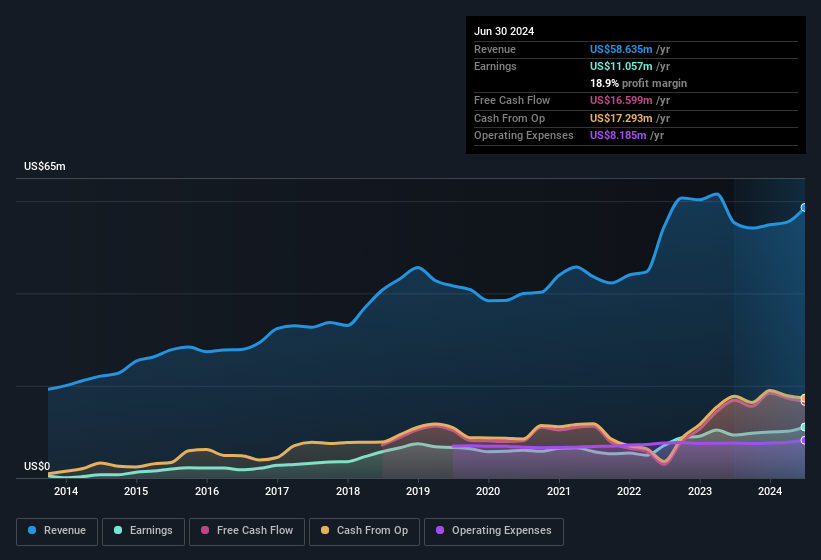
Payton Industries Ltd (TLV:PAYT) just reported healthy earnings but the stock price didn't move much. Our analysis suggests that investors might be missing some promising details.
See our latest analysis for Payton Industries

Examining Cashflow Against Payton Industries' Earnings
Many investors haven't heard of the accrual ratio from cashflow, but it is actually a useful measure of how well a company's profit is backed up by free cash flow (FCF) during a given period. The accrual ratio subtracts the FCF from the profit for a given period, and divides the result by the average operating assets of the company over that time. This ratio tells us how much of a company's profit is not backed by free cashflow.
As a result, a negative accrual ratio is a positive for the company, and a positive accrual ratio is a negative. While having an accrual ratio above zero is of little concern, we do think it's worth noting when a company has a relatively high accrual ratio. Notably, there is some academic evidence that suggests that a high accrual ratio is a bad sign for near-term profits, generally speaking.
Payton Industries has an accrual ratio of -0.26 for the year to June 2024. That implies it has very good cash conversion, and that its earnings in the last year actually significantly understate its free cash flow. Indeed, in the last twelve months it reported free cash flow of US$17m, well over the US$11.1m it reported in profit. Payton Industries' year-on-year free cash flow was as flat as two-day-old fizzy drink. Unfortunately for shareholders, the company has also been issuing new shares, diluting their share of future earnings.
Note: we always recommend investors check balance sheet strength. Click here to be taken to our balance sheet analysis of Payton Industries.
To understand the value of a company's earnings growth, it is imperative to consider any dilution of shareholders' interests. As it happens, Payton Industries issued 22% more new shares over the last year. As a result, its net income is now split between a greater number of shares. To celebrate net income while ignoring dilution is like rejoicing because you have a single slice of a larger pizza, but ignoring the fact that the pizza is now cut into many more slices. You can see a chart of Payton Industries' EPS by clicking here.
A Look At The Impact Of Payton Industries' Dilution On Its Earnings Per Share (EPS)
Payton Industries has improved its profit over the last three years, with an annualized gain of 93% in that time. And over the last 12 months, the company grew its profit by 19%. But in comparison, EPS only increased by 14% over the same period. And so, you can see quite clearly that dilution is influencing shareholder earnings.
Changes in the share price do tend to reflect changes in earnings per share, in the long run. So Payton Industries shareholders will want to see that EPS figure continue to increase. However, if its profit increases while its earnings per share stay flat (or even fall) then shareholders might not see much benefit. For that reason, you could say that EPS is more important that net income in the long run, assuming the goal is to assess whether a company's share price might grow.
Our Take On Payton Industries' Profit Performance
In conclusion, Payton Industries has strong cashflow relative to earnings, which indicates good quality earnings, but the dilution means its earnings per share growth is weaker than its profit growth. Based on these factors, we think that Payton Industries' profits are a reasonably conservative guide to its underlying profitability. If you want to do dive deeper into Payton Industries, you'd also look into what risks it is currently facing. For example - Payton Industries has 2 warning signs we think you should be aware of.
In this article we've looked at a number of factors that can impair the utility of profit numbers, as a guide to a business. But there are plenty of other ways to inform your opinion of a company. For example, many people consider a high return on equity as an indication of favorable business economics, while others like to 'follow the money' and search out stocks that insiders are buying. So you may wish to see this free collection of companies boasting high return on equity, or this list of stocks with high insider ownership.
New: Manage All Your Stock Portfolios in One Place
We've created the ultimate portfolio companion for stock investors, and it's free.
• Connect an unlimited number of Portfolios and see your total in one currency
• Be alerted to new Warning Signs or Risks via email or mobile
• Track the Fair Value of your stocks
Have feedback on this article? Concerned about the content? Get in touch with us directly. Alternatively, email editorial-team (at) simplywallst.com.
This article by Simply Wall St is general in nature. We provide commentary based on historical data and analyst forecasts only using an unbiased methodology and our articles are not intended to be financial advice. It does not constitute a recommendation to buy or sell any stock, and does not take account of your objectives, or your financial situation. We aim to bring you long-term focused analysis driven by fundamental data. Note that our analysis may not factor in the latest price-sensitive company announcements or qualitative material. Simply Wall St has no position in any stocks mentioned.
About TASE:PAYT
Payton Industries
Develops, produces, trades, markets, and sells various types of transformers for communications, electronics, automotive, and industrial equipment industries in Israel, Europe, the United States, and Asia.
Flawless balance sheet with acceptable track record.
Market Insights
Community Narratives



